Outputs circular sectors of influence for point features that have directions defined by azimuths (degrees clockwise from North).
This transformer creates a number of sectors for each set of point features (collectively called a site), depending on each point’s direction of influence. Each sector fans out from the center point (site point) of the site it belongs to, and has a user-defined radius.
This transformer generates a Voronoi diagram that consists of polygons representing the closest areas around center points of sectors (site points). The final output will be the sectors truncated to the extents of their site’s corresponding Voronoi polygons.
This transformer has an additional output port that produces sectors truncated by Voronoi polygons, to eliminate possible overlaps between different sites.
Note: Note: To create sectors that may overlap with sectors of other sites, use the SectorGenerator transformer instead.
Input Ports
This transformer accepts only points. All other geometries are rejected.
If 3D points enter this transformer, they are treated as if they were 2D points.
Output Ports
Sector polygons are output unclipped via this port. Output sectors of different sites may overlap each other.
These are the Voronoi polygons produced by the transformer and used to clip the output polygons of the Cells port.
Cells are sectors truncated by Voronoi polygons. The output sectors from this port do not overlap. To ensure correct output from this port, please refer to the Radius parameter.
For each site, a point is created with coordinates that are the average of the coordinates of all points accepted for that sector. This point is the center of all sectors generated for a site.
If a Sector Name Attribute is specified and there are points with the same sector and site names, only the first point meeting all requirements is considered for creating sectors and the rest are output from this port.
Upon entering transformer, if a point is found to be farther from any of the other points in its site than the specified Maximum Distance Between Site Points, it will be dropped from sector generation and output from this port.
These are output points that are missing or have invalid values for required attributes.
Non-point features are left untouched and output via this port.
Parameters
This is the attribute that determines the site to which an input point belongs.
The direction each input point faces (or influences). The Azimuth Attribute is measured in degrees clockwise from North. Valid Azimuth Attribute values are positive and less than 360.
If a Sector Name Attribute is specified and there are points with the same sector name in a site, only one of the points is considered for creating sectors.
Each feature entering the transformer is checked. If its sector name is already in use within its site, it will be output on the ExtraPoints port.
This parameter defines the radius of influence for each sector. This determines the radius of each sector in a site.
Note: Values of Radii larger than the extents of the area covered by the site points will produce invalid results. Differing values of radii for overlapping sectors will also result in incorrect output.
This parameter specifies the maximum distance a point can be from any other point in its site and still be considered in sector creation.
Points are considered in the order they enter the transformer, with each new point tested against all other points already accepted as a part of its site.
If a nonconstant value is specified for this parameter (e.g., an attribute value, which may differ from feature to feature), then when comparing the distance between two features, the maximum distance will be calculated from the feature that entered the transformer earlier.
No: There may be slight overlaps or gaps between sectors, making the output unsuitable for some geometric operations.
Note that the input points should be in a way that the transformer is able to produce at least three different site points that are not collinear, since a Voronoi Diagram is generated for analysis.
Example
In the telecommunications industry, directional antennas are used in conjunction with each other for better coverage and stronger signal reception. These antennas each cover a sector of a complete circle that an antenna tower covers, with some areas of overlap between each two sectors.
This transformer can be used to determine the “Nominal” (assuming a whole circle is covered and there are no overlaps between any two sectors) coverage field of directional antennas and receivers.
Input points and their azimuth values are received:
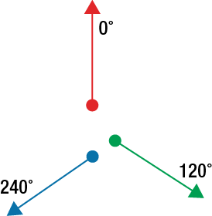
A center point is created for each site:
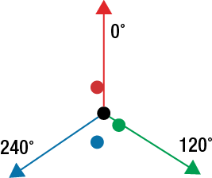
Note: Please note that after this step, the locations of input points play no part in the generation of sectors, and the values that determine sectors are the input points’ azimuths and radii.
Polygon sectors are generated. The sector corresponding to each point will span an area determined by the radius set and:
(The point's azimuth + adjacent azimuth (in degrees))/2
Two sides of a sector are found by one time choosing the closest azimuth clockwise and the next time counter-clockwise. Resulting sectors will look like this:
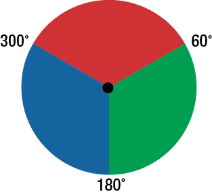
Voronoi polygons are generated, based on site points:
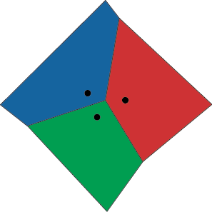
If two sites have overlapping sectors, the sectors are clipped by the Voronoi polygons to generate Cells:
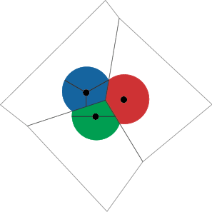
FME Licensing Level
FME Professional edition and above
Editing Transformer Parameters
Using a set of menu options, transformer parameters can be assigned by referencing other elements in the workspace. More advanced functions, such as an advanced editor and an arithmetic editor, are also available in some transformers. To access a menu of these options, click  beside the applicable parameter. For more information, see Transformer Parameter Menu Options.
beside the applicable parameter. For more information, see Transformer Parameter Menu Options.
Transformer Categories
Search FME Knowledge Center
Search for samples and information about this transformer on the FME Knowledge Center.